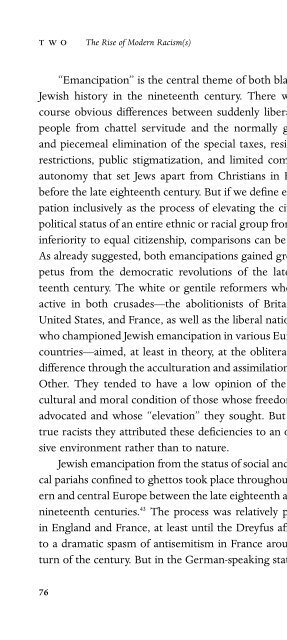Racism - A Short History - George M Fredrickson.pdf - WNLibrary
Racism - A Short History - George M Fredrickson.pdf - WNLibrary
Racism - A Short History - George M Fredrickson.pdf - WNLibrary
Create successful ePaper yourself
Turn your PDF publications into a flip-book with our unique Google optimized e-Paper software.
APPENDIX <strong>Racism</strong> in Historical Discourse<br />
With the rise of Hitler to power in Germany in 1933,<br />
the centrality of antisemitism to “the doctrine of races” or<br />
“racialism” in the modern world became fully apparent for<br />
the first time. It was Magnus Hirschfeld, prominent German<br />
sexologist of the Weimar era and early champion of<br />
homosexual rights, who first gave real currency to the term<br />
“racism” by making it the title of a book. Hirschfeld, an<br />
assimilated Jew, had the good sense to flee when the Nazis<br />
took power, and he finished his critique of Nazi ethnological<br />
theories as an exile in Nice, where he died in 1935, leaving<br />
the work unpublished. The manuscript entitled “Rassismus”<br />
was subsequently translated into English and<br />
published as <strong>Racism</strong> in 1938. 16 As might be expected, the<br />
book is primarily a history, analysis, and refutation of the<br />
racial doctrines that the Nazis brought with them and put<br />
into practice when they gained control of Germany. As a<br />
scientist who was ahead of his time, Hirschfeld had found<br />
little of value or substance in the concept of race: “If it were<br />
practicable, we should certainly do well to eradicate the<br />
term ‘race’ as far as subdivisions of the human species are<br />
concerned.” 17 Hirschfeld, who thought of himself as an objective<br />
scholar and a cosmopolitan rather than an ethnic<br />
loyalist, could make analogies between Germans and Jews,<br />
which, in light of the Holocaust, would now seem offensive.<br />
“Both peoples regard themselves as elect or chosen,<br />
and both are very strongly disliked by everyone else.” 18 But<br />
he perceptively described the psychosocial sources of racism<br />
when he explained the ascendancy of German antisemitism<br />
as a reaction to the loss of the First World War and<br />
the difficulties that followed. <strong>Racism</strong>, he wrote, serves as a<br />
safety valve against a sense of catastrophe. It seems “to pro-<br />
162
















